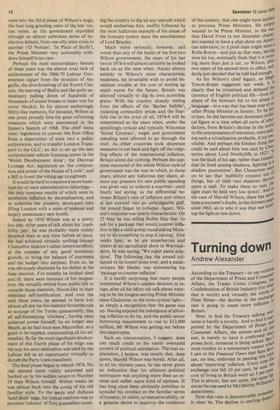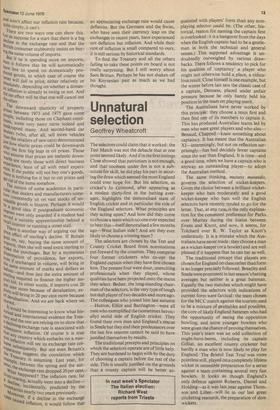Turning down
Andrew Alexander
According to the Treasury—to say no
of the Department of Prices and Consurned Affairs, the Trades Union Congress, t1,,t Confederation of British Industry (for WH'i that is worth) and virtually the wh°Ie Fleet Street—the decline in the exchariE," rate is going to cause more inflation la Britain. Now, to find the Treasury talking n°11sense is hardly a novelty. And to find it surci thing ported by the Department of Prices 311/le Consumer Affairs, the unions and all t t tha rest, is merely to have it confirmed t i prima facie, nonsense is being talked. 13°0 must confess to a momentary tremor wnilit, I saw in the Financial Times that Sarn tan, no less, endorsed in passing this vil; about 'importing' inflation. Every tin the exchange rate fell 10 per cent, he said' nt, cost of living in Britain went up 3 Per fefig, This is almost, but not quite, the saril%s,s ure as the one used by Mrs Shirley William' department.
Now this view is demonstrable nonser!e,i It must be. The decline in sterling does"
and won't affect our inflation rate because, (lane simply, it can't. There are two ways one can show this. Let us suppose for a start that there is a big dhecline in the exchange rate and that the ish consumer stubbornly insists on buying the same volume of imports. Rut if he is spending more on imports, Lthen it follows that he will automatically d"ave less to spend on domestically pro
goods, in which case of course the
:1;ter will fall in price, either relatively or ,s'Ysolutely, depending on whether a domesthe inflation is already in swing or not. And „e net effect will be that one will cancel out `1'e other. The downward elasticity of property Prices between 1973 and 1975 gave some ehecInle, including those on Clapham omnibuses, some very nasty turns indeed and ankrupted many. And second-hand car dtkealers (who, after all, sell more vehicles ;uan the retailers of new cars) demonstrated Just how elastic prices could be downwards awfter the first big leap in oil prices. Those %,1-1° assume that prices are inelastic down are rarely those with direct business ekr,Dertence, least of all with retail experidi-ce. If the public will not buy one's goods, ere is nothing for it but to cut prices and Get rid of the items somehow, e„The notion of some academics in partiC'Iar that dealers and manufacturers somesalw contentedly sit on vast stocks of unheeable goods is bizarre. Perhaps it would de-ua good idea if postgraduate economic se-r°,,rees were only awarded if a student had tei;e:,(1 a suitable apprenticeship behind a
..„,"" counter or running a street stall. Dr Ice( here is another way of arguing out the effect of sterling's decline. If Britain
ith-hs °n, say, buying the same amount of th:„°fts, then she will need extra sterling to dis'e the purchases. But by a mysterious ev Densation of providence, her exports, the" if unchanged in volume, will bring in het, satne amount of marks and dollars as ster°i,re—and thus just the extra amount of Dong required to finance the higher imDetr-t bill. In other words, if imports cost 20 Ports more because of devaluation, exo ds will bring in 20 per cent more because :valuation. And we are back where we sta. ed • It wo , tooe utd be interesting to know what hisand international evidence the Trea a d'eca.nd the rest are relying on to show that sobs lining exchange rate is associated with thatequent inflation. Of course it is true sive rlY country which embarks on a maslapsenflation will see its exchange rate colekoer.subsequently. But not even Britain's the ..„-lence suggests the correlation which exan.: easury is assuming. Last year, for or" Die, between the spring and the auttt,', the exchange rate dropped 20 per cent. fro"Trinat 1-, -aPpened? The inflation rate, far a deer; aring. actually went into a decline— Rion_ 'ne, incidentally, predicted by the tviearists nearly two years previously. rate„ reover, if a decline in the exchange caused inflation, it would follow that
an appreciating exchange rate would cause deflation. But the Germans and the Swiss, who have seen their currency leap on the exchanges in recent years, have experienced not deflation but inflation. And while their rate of inflation is small compared to ours, it is still serious by historical standards.
To find the Treasury and all the others failing to take these points on board is not really surprising. But I still worry about Sam Brittan. Perhaps he has not shaken off his Keynesian past as much as we had thought.



































 Previous page
Previous page